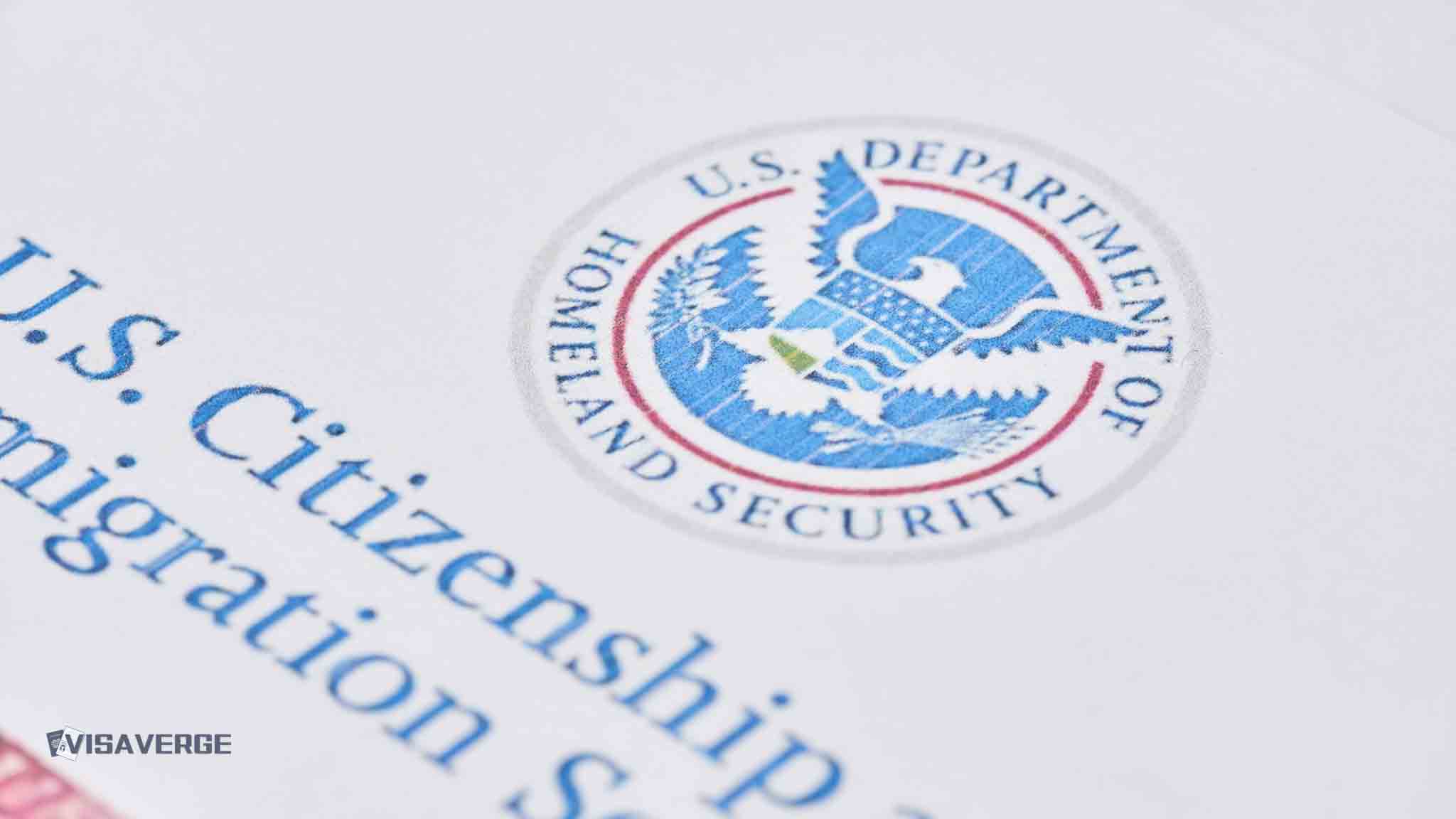Sweeping changes to U.S. citizenship rules are now in effect, as the U.S. Citizenship and Immigration Services (USCIS) has redefined who can become a citizen and how the process works. As of July 30, 2025, new policies, forms, and stricter checks are changing the path to naturalization for thousands of immigrants across the United States 🇺🇸.
USCIS’s latest updates bring both relief and new challenges for applicants. The most important changes include a simpler rule for proving lawful admission, tougher background and social media checks, stricter medical exemption standards, and new forms and fees. These changes affect anyone hoping to become a U.S. citizen, from long-term green card holders to recent arrivals.

Redefining Lawful Admission for Naturalization
One of the most significant updates came on November 14, 2024, when USCIS clarified how applicants must prove they were lawfully admitted to the United States 🇺🇸. Before this change, anyone applying for U.S. citizenship had to show they were lawfully admitted every time they reentered the country. This rule made it hard for lawful permanent residents (LPRs) who traveled abroad often, as even a single mistake or missing document could cause problems.
Now, under the new policy found in Volume 12, Part D, Chapter 2 of the USCIS Policy Manual, applicants only need to prove they were lawfully admitted when they first received their green card or adjusted their status. This change means fewer denials for people who have traveled outside the United States 🇺🇸 and makes the process less stressful for many families.
Tighter Background Checks and Social Media Screening
In 2025, USCIS began requiring all naturalization applicants to disclose their social media accounts as part of the background check process. This new rule is meant to help USCIS spot fraud, criminal activity, or security risks more easily. The agency can now ask other government departments for information about an applicant, even if that information is classified or not usually shared.
Applicants must list all social media handles and platforms they have used in recent years. If USCIS finds anything suspicious or false in an application, it can delay or even deny citizenship. Immigration lawyers warn that this new rule means applicants should be very careful about what they post online and should review their social media history before applying.
Stricter Medical Exemption Standards (Form N-648)
Some people applying for U.S. citizenship can ask for a medical exemption from the English and civics tests if they have a disability that makes it impossible to meet these requirements. In June 2025, USCIS made it harder to get these exemptions. Now, doctors must provide much stronger proof that the disability directly prevents the applicant from learning English or understanding U.S. history and government.
The updated Form N-648 asks for more details and supporting documents. This means fewer people will qualify for medical exemptions, and those who do must work closely with their doctors to make sure all paperwork is complete and convincing.
Updated Eligibility Requirements for Naturalization in 2025
USCIS has also updated the basic requirements for naturalization. To qualify for U.S. citizenship, applicants must now meet the following:
- Continuous Residence: Applicants must have lived in the United States 🇺🇸 for at least 30 months out of the last five years before applying. If someone leaves the country for too long, they may break their continuous residence and have to start over.
- Physical Presence: Long trips outside the United States 🇺🇸 can affect eligibility. USCIS checks travel history closely to make sure applicants have spent enough time in the country.
- Good Moral Character: USCIS looks at criminal records, tax filings, and whether the applicant has followed immigration laws. Even small problems, like unpaid taxes or minor legal issues, can cause delays or denials.
- English and Civics Tests: Most applicants must show they can read, write, and speak basic English and pass a test about U.S. history and government. Only a few people, such as those with approved medical exemptions or certain older applicants, can skip these tests.
New USCIS Forms and Processing Changes
Starting in early 2025, USCIS released new versions of key forms, including the N-400 Application for Naturalization. Applicants must use the edition dated 01/20/25 or later. These new forms include stronger warnings about fraud and clearer instructions. Using an old form can lead to automatic rejection, so it’s important to double-check before submitting any paperwork.
Processing times for naturalization applications have also increased. Backlogs mean it can take many months, or even over a year, to get a decision. USCIS recommends that applicants prepare their documents early and apply well before any planned travel or important deadlines.
Fee Adjustments and Expanded Fee Waivers
USCIS changed its fee schedule in January 2024 and again in 2025. The standard fee for the N-400 naturalization application is now $380 for people whose household income is between 150% and 400% of the Federal Poverty Guidelines. This is a reduction from previous years, making citizenship more affordable for many families.
USCIS has also expanded fee waivers and discounts for certain groups, including:
- Victims of human trafficking
- Members of the U.S. military
- Adoptees
These changes are meant to help vulnerable people and those who serve the country become citizens more easily. Applicants can check if they qualify for a fee waiver by reviewing the USCIS Fee Schedule.
Political and Legal Context
The return of President Trump to office in January 2025 has shaped the current immigration environment. New executive orders target birthright citizenship and place more limits on asylum seekers. While some of these orders face legal challenges in court, they have created a stricter atmosphere for anyone dealing with USCIS.
Advocacy groups worry that these changes may discourage some immigrants from applying for citizenship, especially those who fear that stricter background checks or social media reviews could be used unfairly. At the same time, USCIS officials say the new rules are needed to protect national security and make sure only qualified people become citizens.
Practical Implications for Applicants
Anyone thinking about applying for U.S. citizenship should pay close attention to these new rules. Here are some practical tips for navigating the process:
- Use the Latest Forms: Always download the newest version of the N-400 and other required forms from the official USCIS website. Using an outdated form can cause delays or denials.
- Prepare for Social Media Checks: Review your social media history and be ready to share all account names and platforms. Remove any posts that could be misunderstood or raise questions.
- Gather Strong Medical Evidence: If you need a medical exemption, work with a doctor who understands the new requirements and can provide detailed records.
- Track Your Travel: Keep careful records of all trips outside the United States 🇺🇸, including dates and reasons for travel. This will help prove continuous residence and physical presence.
- Check Fee Waiver Eligibility: If you have a low income or belong to a special group, see if you qualify for a reduced fee or waiver.
- Apply Early: Because processing times are longer, start your application as soon as you meet the requirements.
Expert Analysis and Stakeholder Perspectives
Immigration attorneys stress the importance of careful planning and preparation. “With the new background checks and stricter rules, it’s more important than ever to get your documents in order and seek legal advice if you have any doubts,” says one immigration lawyer.
Advocacy groups are concerned that the expanded social media checks could unfairly target certain communities. They point out that people from countries with political unrest or those who speak out online may face extra scrutiny. “We urge USCIS to apply these rules fairly and not let bias affect decisions,” says a spokesperson for an immigrant rights group.
USCIS officials, on the other hand, say the changes are designed to protect the integrity of the naturalization process. “We want to make sure that those who become U.S. citizens have met all the requirements and are committed to the values of the United States 🇺🇸,” says a USCIS representative.
Background and Historical Context
Before these changes, the process for proving lawful admission was much more complicated. Frequent travelers often faced denials because they could not provide documents for every reentry. The new rule, which only requires proof at the time of getting a green card, removes a major barrier for many applicants.
USCIS has been updating its forms and procedures since 2023 to fight fraud and improve efficiency. The latest changes are the most comprehensive yet, affecting almost every part of the naturalization process.
Fee changes are also part of a larger effort to make citizenship more accessible. By lowering costs for low- and middle-income families, USCIS hopes to encourage more people to apply.
Future Outlook and Pending Developments
Some of President Trump’s executive orders, especially those targeting birthright citizenship and asylum, are being challenged in court. The outcome of these cases could affect future USCIS policies and who is eligible for citizenship.
USCIS is also expected to keep updating its procedures. This may include more digital processing, better use of biometrics (like fingerprints and photos), and new guidance for special groups such as military members and people with Temporary Protected Status (TPS).
Applicants and their families should stay informed by checking the USCIS Newsroom for the latest updates.
Case Study: Maria’s Path to U.S. Citizenship
Maria, a lawful permanent resident from Mexico 🇲🇽, has lived in the United States 🇺🇸 for six years. She travels to visit family in Mexico 🇲🇽 every year. Under the old rules, Maria worried that missing a document from a past trip could ruin her citizenship application. With the new policy, she only needs to show proof of her original green card approval.
Maria also works two jobs and supports her children. Thanks to the new fee schedule, her application fee is now $380, which she can afford. She reviews her social media accounts and removes old posts that might cause confusion. Maria’s doctor helps her fill out Form N-648 for a medical exemption, providing detailed records as required.
Maria applies early, using the latest N-400 form. She keeps copies of all documents and checks the status of her application online. By following the new rules, Maria feels more confident about her chances of becoming a U.S. citizen.
Action Steps for Applicants
- Download the latest forms from the USCIS website.
- Review your social media and prepare to disclose all accounts.
- Consult a qualified immigration attorney if you have a complex case or need a medical exemption.
- Check your eligibility for fee waivers and discounts.
- Keep up with policy changes by visiting the USCIS Newsroom.
Conclusion
The new USCIS rules for U.S. citizenship and naturalization bring both opportunities and challenges. While some changes make the process easier, others add new hurdles. Careful preparation, attention to detail, and staying informed are the best ways to succeed under the new system.
As reported by VisaVerge.com, these sweeping updates reflect a broader shift in U.S. immigration policy, with a focus on security, fairness, and efficiency. For anyone hoping to become a U.S. citizen, understanding these changes and taking proactive steps is more important than ever. If you have questions or need help, consider reaching out to a trusted immigration attorney or community organization for support.
Learn Today
Naturalization → The legal process by which a non-citizen acquires U.S. citizenship after meeting eligibility requirements.
Lawful Admission → A formal entry into the U.S. by an immigrant with permission from immigration authorities.
Form N-400 → The official USCIS application form used to request U.S. citizenship through naturalization.
Medical Exemption → A waiver allowing applicants to skip English and civics tests due to qualifying disabilities.
Social Media Screening → USCIS’s review of applicants’ social media accounts to detect fraud or security concerns.
This Article in a Nutshell
USCIS’s 2025 citizenship rule updates simplify lawful admission proof but introduce tougher social media checks, stricter medical exemption standards, new forms, and fees, reshaping the naturalization process nationwide.
— By VisaVerge.com






